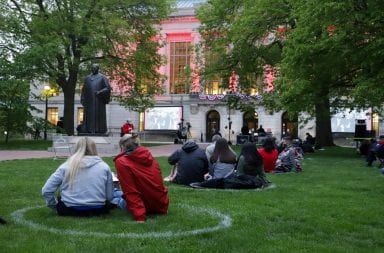Booze brings big business and millions of dollars to numerous stores near Ohio State campus, but which ones earned the most in fiscal year 2012 might be surprising to some.
The Giant Eagle at 1451 W. Fifth Ave. sold almost $6.4 million in spirituous liquor during fiscal year 2012, but the Kroger at 1350 N. High St. only sold about $3 million, said Matt Mullins, a spokesman for the Ohio Division of Liquor Control.
Spirituous liquor is classified as being more than 21 percent alcohol, which does not include beer, wine or low-proof alcohol, Mullins said.
The Giant Eagle at 777 Neil Ave., closer to the campus area, is not a contract liquor agency, which means it is able to sell beer, wine and low-proof liquor but not spirituous liquor, he said.
The total revenue earned in spirituous liquor sales is not the profit made by the business, Mullins said. The business makes 4 percent of the wholesale liquor sales and 6 percent of the retail liquor sales.
A spokesman for the Ohio Wholesale Beer and Wine Association said that due to sales competition between alcohol distributors, dollar sales for individual businesses are not readily available through the state.
Melissa Blume, a fourth-year in human development and family science, said she thought it was “weird” that Kroger sold less liquor than Giant Eagle, but said, “it could be because there are a lot of young professionals (living near Giant Eagle).”
She said she lives on the north side of campus and, for her and others near her, Kroger isn’t as convenient as a gas station or local liquor store.
The Campus State Liquor Store, located at 2465 N. High St., just north of West Blake Avenue, had dollar sales almost $6.8 million in fiscal year 2012, Mullins said.
There are different permit classes available depending on the business entity selling alcohol. For example, a C1 permit is for beer carryout only and costs a business $252 per year, while a D5 permit that allows full on-site liquor sale privileges until 2:30 a.m. costs $2,344 per year, according to the Ohio Division of Liquor Control website.
Mullins said there are three main entities in the state of Ohio that control liquor sales. The Ohio Division of Liquor Control handles the permit sales, the Ohio Liquor Control Commission enacts the enforcement and the Ohio Investigative Unit of the Ohio Department of Public Safety handles enforcement of the laws.
“We all work together but also separately,” Mullins said. The system allows for “checks and balances.”
In order to obtain a permit, there must first be a permit available to be sold. Mullins said the number of permits distributed is based on each taxing district. The city of Columbus as a whole is considered one district.
SuAnn Cook, agent-in-charge of the Columbus District of the Ohio Investigative Unit, said there are about 24,000 permits issued in the state of Ohio.
However, many class permits are exempt from the allotted quota, Mullins said. The Arena District in downtown Columbus is considered a Community Entertainment District by the city of Columbus, which means any business in the district is allowed to file for a liquor sales permit regardless of the tax district quota. A CED permit is also $2,344 per year, the same as a D5 permit.
Feb. 1 of each year is the day inspections take place in Columbus. The renewal inspectors check for regulated administrative issues such as proper sanitation, Mullins said.
Agents like Cook have the ability to issue violation notices against permits holder by local businesses.
Administrative charges can include Sunday sales, after-hour sales and selling to already intoxicated individuals, said Jackie Williams, executive director of the Ohio Liquor Control Commission.
Several area businesses located along High Street near the OSU campus had permit violations in calendar year 2012. According to dockets provided by the state of Ohio, at least the 14-0 Express Carryout and Buckeye Express in the campus area all had violations for selling to individuals under the legal age of 21. In addition, Gusses Enterprises, LLC, and Scarlet and Gray Café had violations for insanitary conditions where alcoholic beverages were not maintained in potable conditions. Each of these cases are still open.
Buckeye Express, Scarlet and Gray Cafe and 14-0 Express Carryout did not respond for comment. Gusses Enterprises declined to comment.
Cook said that while a violation for selling to a minor is considered a criminal offense, the customer and the seller are the individuals charged while the business itself would be required to go to a hearing at the commission. The underage individual purchasing the alcohol could be charged with a misdemeanor of the first degree and the seller could be charged with an unclassified misdemeanor.
The commission itself acts as a court but only handles the administrative matters, Cook said.
There are three commissioners that are the deciding factors on hearings. A permit violation could result in a fine, a suspension or a revocation, Williams said.
“A revocation is serious and there are usually a number of prior offenses,” Williams said.


